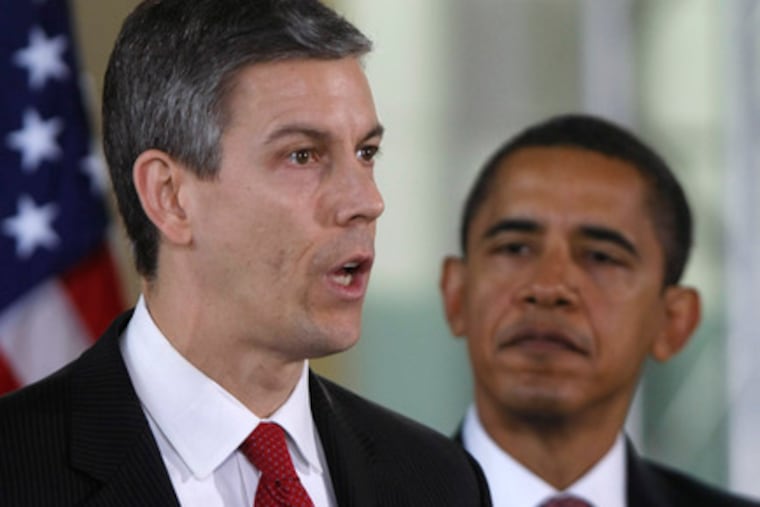Chicago schools chief is Obama's education pick
In seven years as chief executive of the Chicago school system, Arne Duncan earned a reputation as a leader who pushed for strong measures to improve schools but also reached out to the teachers union and the community.

In seven years as chief executive of the Chicago school system, Arne Duncan earned a reputation as a leader who pushed for strong measures to improve schools but also reached out to the teachers union and the community.
As President-elect Barack Obama's choice to become the nation's next education secretary, he will draw on that background to try to bridge the deep divides among education advocates, teachers unions and civil rights groups over how to fix America's schools.
"When it comes to school reform, Arne is the most hands-on of hands-on practitioners," Obama said at the Dodge Renaissance Academy in Chicago yesterday as he announced the nomination.
Obama noted that Duncan had closed some "failing" schools and championed public charter schools despite controversy.
"When faced with tough decisions, Arne doesn't blink," Obama said. "He's not beholden to any one ideology, and he's worked tirelessly to improve teacher quality."
Under Duncan's leadership of the nation's third-largest school system, charter schools were expanded and a performance-pay plan was launched with the blessing of teachers. He supports a program to bring people into teaching who have little classroom experience but strong academic backgrounds. In 2006, he called on Congress to double funding for the No Child Left Behind law.
With Duncan at the helm, Chicago's graduation rate has edged up and test scores have improved. "In just seven years, he's boosted elementary test scores here in Chicago from 38 percent of students meeting the standards to 67 percent," Obama said. "The dropout rate has gone down every year he's been in charge."
Duncan's résumé appeals to those who identify themselves as reformers and tend to support tough accountability, charter schools, performance-pay plans, and other steps that shake up the status quo. But his calls for increased funding and willingness to partner with teachers also win the approval of unions and school officials who think the federal government imposes too many sanctions without offering enough support.
"Duncan is someone we believe can work with everyone, and that's going to be an important part of setting a new tone to get things done in the new administration, instead of treading water," said Joe Williams, head of the New York-based Democrats for Education Reform.
Duncan, 44, a Harvard University graduate, has close ties to Obama and has helped shape his education platform. During Obama's time in Illinois, the pair visited schools in Chicago but also bonded over pickup basketball.
On the spectrum of education advocates, nearly everyone finds something to like about Duncan. Education Secretary Margaret Spellings calls him a "reform-oriented school leader who has been a supporter of No Child Left Behind and accountability."
Former Chicago schools CEO Paul Vallas, who hired Duncan as his deputy chief in 1998, said Duncan "has the brains, courage, creativity and temperament for the job." Vallas, a former Philadelphia schools chief who now heads New Orleans schools, praised him as a "bona fide school reformer."
Duncan will take over the Education Department at a pivotal time. Efforts to revamp the 2002 No Child Left Behind Law, which aims to boost achievement of children from poor families, has been on hold as Congress awaited the new president's vision. But many educators and lawmakers on both sides of the aisle have soured on the law, which requires states to rate schools on student test scores. Teacher unions and some school officials see it as too rigid and punitive.
Obama has promised to "fix the failures" of the law, but hammering out details will not be easy. He has pledged to improve testing and create a more nuanced way to hold schools accountable. But some of the law's advocates, including civil rights groups that applaud the spotlight on minority student performance, worry the law could be watered down.
Duncan's challenge will be to help lawmakers and advocates reach agreement, said Michael J. Petrilli, who was associate assistant deputy secretary of education from 2001 to 2005 under President Bush. "President-elect Obama has reform instincts, but he's also a diplomat and is careful to not alienate key constituencies," Petrilli said. ". . . That's going to be a delicate balance to walk the line between the reform camp and the education establishment."
Many of Obama's plans for the nation's schools are already underway in Chicago. Citing the success of charter schools, Obama vowed to double federal funding for such schools to $400 million. He also wants to expand a teacher residency program in Chicago that prepares teachers to work in high-poverty schools.
Arne Duncan
44; born Nov. 6, 1964.
chief executive officer, Chicago Public Schools, 2001 to date; deputy chief of staff, Chicago Public Schools, 2000-01; director of magnet schools and programs, Chicago Public Schools, 1998-2000; executive director, Ariel Education Initiative, 1992-98; pro basketball player in Australia, 1987-91.
bachelor's degree
in sociology, Harvard University, 1987.